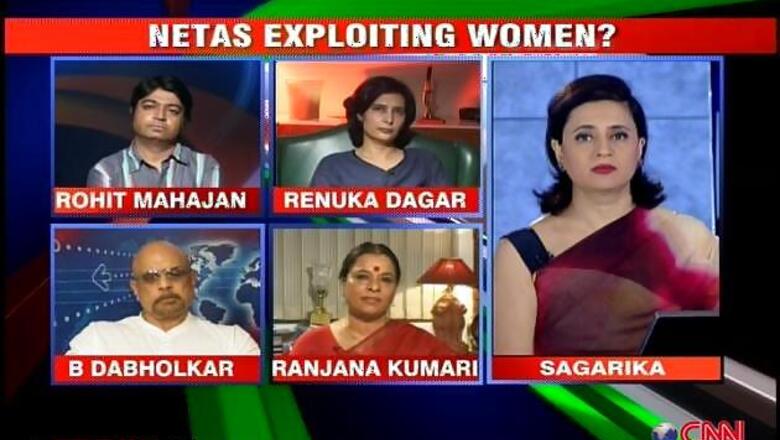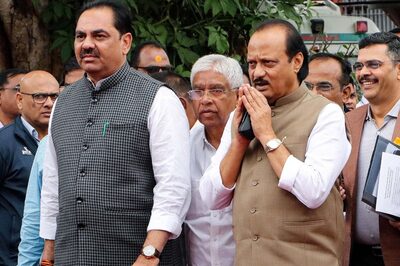
views
In the past few days, two stories of suicides have come to the fore from Haryana, both involving politicians. Twenty-three year old Geetika Sharma committed suicide on Sunday, naming Haryana politician Gopal Kanda in her suicide note and the death of Anuradha Bali alias Fiza second and estranged wife of Haryana politician Chander Mohan, remains a mystery.
The question is whether women are victimised in relationships with politicians. CNN-IBN Deputy Editor Sagarika Ghose took up the question with a distinguished panel on her show Face the Nation.
Following is the transcript of the discussion that took place on Face the Nation:
Sagarika Ghose: Hi there, we're focusing on the death of two women, 23-year-old Geetika Sharma who committed suicide on Sunday, naming Haryana politician Gopal Kanda in her suicide note and the death of Anuradha Bali alias Fiza, second and estranged wife of Haryana politician Chander Mohan. Two women, both dead, both associated with politicians, in this case Haryana politicians. Are women in danger of being victimised in relationships with politicians? Joining us tonight Rohit Mahajan, Fiza's Friend and Lawyer, Professor Renuka Dagar, Social Researcher, IDC, Bharat Dabholkar, Ad maker, Ranjana Kumari, Director, Centre For Social Research.
Rohit, I would to know from you first, you were Fiza's friend, the way her body was found, she was alone in the house, four days later an uncle came who discovered the body. Does this show that Fiza was very lonely?
Rohit Mahajan: Yes it is true that in the end she felt the loneliness.
Sagarika Ghose: But why was she so disappointed? She was educated, she was a lawyer, did she not have any job or she was not seeing any future?
Rohit Mahajan: See, I knew her for past 17 years, we passed out law graduation together. She was a very daring woman and her aims and objectives were very high. She wanted to do something big, she wanted to become something. She often used to tell me that there will be something big happen for the country from my side, I have to do something so that world remembers me. So she quickly climbed the ladder of success, she became Assistant District Attorney then Punjab Assistant Advocatye General, and then Haryana Assistant Advocate General. Then this cycle got linked to Chander Mohan.
Sagarika Ghose: Did she not get help from anywhere. Did her family and the society rejected her?
Rohit Mahajan: No, it's not like that. Circumstance became such that slowly changes came to her nature. The changes were not that she became adamant or aggressive, she had a dominant nature from the beginning that's why those who used to understood her got along with and others who don't got away.
Sagarika Ghose: Fiza was an ambitious woman she wanted to go ahead in life but after her relationship with Chander Mohan fell upon very bad times and she became depressed and lonely. Renuka Dagar, the common patterns between Geetika and Fiza were these are single women, they got associated with married politicians, politicians who wielded enormous power, in this situation given the disparity between the family and the politicians, do these situations end up becoming exploitative of women?
Renuka Dagar: Certainly they do, I think these kind of situations comment on that nature of politics which draws this power from a trading culture. So whether you are trading vote banks on caste and culture, whether that is providing freebies and when female become part of this trading ground then repercussion are quietly ugly and deadly for the female gender not just the woman itself. Of course there is a prior background we do see that there is attached to the female body. A lot of women now are moving out in public, they are going out for education, they have confidence, they have acquired capacity, they also have resources. But when a body becomes a thing of exchange that trap things up. On one hand you have acquired the celebrity status to the female body and on the other hands there are social norms that stigmatise such conduct. So when you perceive right and not realise in reality you are only left with two options either you submit or you exit. And in these two cases there has been the exit strategy that has been the suicide.
Sagarika Ghose: Those are very good insights, use of the female body as a resource and then when the success don't come submit or exit. Ranjana Kumari let me put you the point that Renuka also put that is the aspiration, in both of these cases, that they were women of aspiration, ambition, that they was nothing possible wrong with them. Given the fact of aspiration in order to rise in life you do sometimes get tempted by the politicians who wield power, who wield influence, you can be hold out for promises and then when those promises don't come true you could be terrible betrayed.
Ranjana Kumari: Well Sagarika let's look at it in a larger context, what has been happening in the history and even today globally that power and money becomes a tool in the hand of the patriarchy to exploit women. There is nothing wrong with aspiration, men also aspire but don't get used. Who knows if these to women would have not being submitted they would have been killed. We know the famous cases in UP and other places where these women were killed. We know that journalist who was killed. There are two things if they are used by these politicians they look at these politicians backyard, it happens internationally whether it was Mr Clinton, whether it was Mr Kahn, whether it Mr Berlusconi. I think in all those cases they had to stand the scrutiny. In our country they can get away with it, that is why they are behaving the way they are behaving that is why every politician by and large have a backyard of exploitation.
Sagarika Ghose: That's a very good point. The men very suffer because of these liasions and because of our structure 'mard hai, sher hai' and the women suffer. Bharat Dabholkar, why only blame the politicians, isn't it the same story in the Bollywood or elsewhere where powerful men use their power to exploit women and women, as Renuka and Ranjana are saying, are aspirational, they would now not submit like the women generations ago used to do. Is there a urge to exploit a woman who wants to rise in life?
Bharat Dabholkar: I think there are two things, in Fiza's case it is a question of love gone wrong, I think the man involved here is a politician, it could have been a Bollywood director, producer.
Sagarika Ghose: The question is then why would he not leave his wife and marry her?
Bharat Dabholkar: He did marry her.
Sagarika Ghose: Why wouldn't he then make it a legitimate marriage by divorcing her wife and then marrying her?
Bharat Dabholkar: Maybe his wife didn't give divorce. I don't know why he did converted to Islam, I am not getting into that. I am making one distinction here because I know millions of women who work very hard morning to night they look after there families and work for a small sum, and they are not looking compromise their morals. I know a lot of women who wanted to make their career in entertainment but they were not ready to compromise on their morals that's why they haven't made it. I think we have to make a distinction of exploitation of need, a girl has a need of help for survival and that is why she is giving in. and then there is exploitation that comes out of greed that I want all the good things very fast. I think that distinction is very necessary because I think if it the exploitation of need then a man has to be blamed but if it is a exploitation of greed then it is a barter system that is saying that I'll give you all the good thing in life for which you have to trade in your body.
Sagarika Ghose: Renuka, this is not exploitation, this is barter. Here bodies are used both ways.
Renuka Dagar: Absolutely, the minute you get in body as a point of exchange then there will be negative repercussions. In a male dominated society the repercussions will be much worse for the female. So whether it is a male or a female, when you make a body as a ground of exchange… what is politics as we know as the major stake holder of providing citizens dignity and right and if this section of politics are going to this kind of message across then the kind of message would be against it that this is not acceptable.
Sagarika Ghose: But Ranjana as you were saying that men repeatedly get away with it and it the women who dies and it the women who are being killed. In July 1995, youth Congress leader Sushil Sharma killed his wife Naina Sahani who he thought was in a illicit relationship, poet Madhumita was killed on the orders of wife of UP minister Amanamni Tripathy, Shehla Massod murder was allegedly was a part of a love triangle. Bhanwari Devi was killed for allegedly blackmailing a Rajasthan minister, so it is the women who are dying. So ultimately the power is wielded by the men to kill these women and still get away with it.
Ranjana Kumari: Absolutely, it is a sad perspective when we start looking at women and start blaming them. One of the panellist's statement about moralising them, some women compromise, some women don't compromise, some women standby whatever morality he is trying to propagate. I think it is precisely the question why men get away with it. It is almost as if you are saying that why do you wear mini-skirts, why do you go out in the night, that's why it is all happening.
Sagarika Ghose: Bharat Dabholkar comment on that, it is only the women who are committing suicide, getting killed, this is not barter, this is not give and take, the power equation is so unequal that I is only the women who end up giving their lives.
Bharat Dabholkar: No Sagarika, it is still give and take but it is a give and take gone wrong. I am a strong believer that any crime against women should be punished very severely. I have always said that a rapist should be castrated. I molester should flocked in the public.
Sagarika Ghose: But it never goes wrong for the men.
Bharat Dabholkar: I am saying if you are rapist you should be castrated, what more can I say. I am saying these women are educated women from a middle class family and they try to get success by latching on to a rich man.
Sagarika Ghose: Rohit tell us was Fiza threatened?
Rohit Mahajan: She was often threatened on the phone. And recently I came to know that a security man who has given the statement and said that she need private security because of the life threats. We had already given all this to police in written that Fiza should be provided with protection.
Sagarika Ghose: What Fiza used to tell, does she used to say that I have to live my life, I want to carry on my life or was she in depression?
Rohit Mahajan: It is not like that, there was nothing she said about depression. She always has been a daring, bold woman. It is out of my imagination that, that woman can commit suicide.
Sagarika Ghose: So you don't believe that Fiza committed suicide but that there is some foul play in this?
Rohit Mahajan: It cannot be a suicide, only the reports will tell whether it is natural death or an unnatural death.
Sagarika Ghose: Let me come to you Renuka, the fact that a friend is saying that this is a unnatural death is possibly a presumption but the power differential between these women and the politicians, does societies and families turn their back? In Geetika's case we saw the family themselves was going with Kanda, they visited Shirdi, they went on trips, is this the case where the family also becomes enamour of the celebrity of the politician? And in Fiza's case we saw that the family had no relationship with Fiza, her uncle came after four days who discovered the body. Does the woman snap ties with the family, does she lose social support?
Renuka Dagar: I think it is a very relevant point that is not only the woman who is negotiating in this trade off, there are families, friends who allow you this social leeway. They say if you are going to a reality show their dance movements, their sexual talks with the anchor, or the lady on the floor, all the is allowed, the father is clapping and cheering, but maybe they don't want that to go further step. the moment you take body as a point of negotiations that's where you are exchanging celebrity status.
Sagarika Ghose: Ranjana Kumari, is this the hopelessness because of the familes turn their back or the families also jump on the celebrity band wagon that the politician carry. You get cut off, you get cut off by the society, and male politicians never do.
Ranjana Kumari: Have you heard of an expression called fallen men, these are fallen women, the women who eloped, the women who latched on to, look at the language, men themselves talks about domination and subordination and look at the way it is described, the woman eloped with this, the man never elopes with the woman, the man doesn't exist and it is so sad. What about the aggressors, what about the men who do it, they never come to the camera. Have they ever tried to explain their behaviour? No. That's what explains the unequal power in the society.
Sagarika Ghose: It is a terrible equation of power, the men will keep on getting away with this and the women will lose their lives. That's the story.
Bharat Dabholkar: I think it is a disgrace that men are allowed to get away with this.




















Comments
0 comment